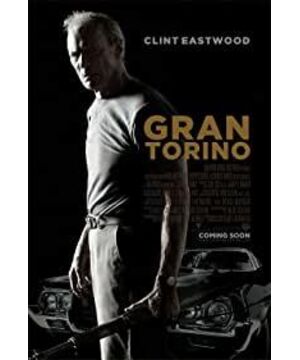After all, since 1993's "Sniper on the Line of Fire", he has never appeared in other director's works, only in his own film. This is not conceit, but the realization of a realm. Eastwood's ravaged face, though increasingly alluring, never shuns the role of a late-twilight hero. Such as the old cowboy in "Unforgivable", the old bodyguard in "Sniper", and the old boxing coach in "Million Baby". So, we ushered in "Classic Car" again. In the film, he plays Walter, a veteran. Walter is eccentric and rude. Because I have served in Asia, I always look down on Asians. So he was in constant conflict with his Miao neighbors. He also has an old Ford, which, while full of problems, is his treasure. Because of this car, he had misunderstandings and conflicts with his neighbors. But then, through slow contact, he also changed, and finally became good friends with them. He even helped the neighbor boy out of the shadows, encouraging and changing him. If the film reaches this point, it will become a mixed version of "Scent of a Woman" and "Crash". A group of bullocks raided a neighbor's family and ravaged their daughter Su. Walter was furious at this point. At this time, we all think of Walter picking up his robbery and going to those people to settle accounts. But he didn't. In that case, the film would end up in an "Unforgiven" style. He trimmed his hair, changed into a suit, and went to church to make a confession. So far we don't know what he's going to do. The final result was that he found the bullocks alone, and tricked them into a round of bullets by pretending to draw a gun. He put those people in jail with his death.
Moving? Shocked? Can't express exactly how I feel after watching it. Eastwood's character, like his previous roles, is marked by pride, indifference, and stubbornness. This image with a strong rebellious color seems to be a cynic among all living beings walking alone on a path that they feel honored. But Walter finally chose to convert to religion, defending justice with a suicidal act of defense. This extreme approach is not the only solution. But when the protagonist is seriously ill and has no one to support, such a move is easy to understand. Some people say that the film is a political metaphor. But I think the film reflects more social issues than political issues. The funeral at the end of the film is solemn and solemn, which is in contrast to and echoes with the somewhat playful funeral at the beginning. This transformation may be the transformation of the protagonist, and the transformation of the protagonist to the rest of the people.
The film is very good, although the old man failed to win the favor of the Oscar this time. But the old man doesn't seem to have to use any honor to prove anything. It should be added that the theme song at the end of the film was composed and sung by Clint, and Cangsang's voice and tune are very infectious. We really don't know what else Clint Eastwood will do when he's about to turn 80, and there are still those cells in his body that haven't been activated yet.
View more about Gran Torino reviews










